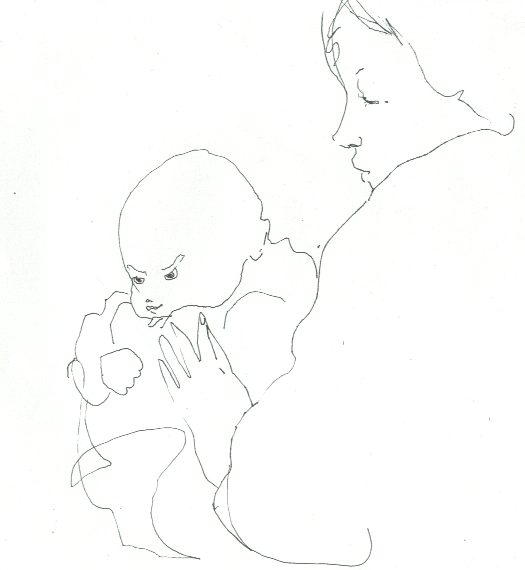This essay is part of our “On Mothering and Language” series.

I want to hit my one-year-old baby.
He’s throwing another tantrum. It has become a daily routine at daycare pickup since he aged into a new class three weeks ago. He appears calm in class, suspiciously too quiet. “He’s such an angel,” his new teacher says at pickup. “I wish other kids can sit still like him.” As soon as we get in the car, however, he releases all the emotions he bottled up during the day. Amidst a storm of screams and tears and flailing arms I try to say, “Mình đi về nha. Mẹ đây. Mẹ chở con về.” Overwhelmed with big feelings, he fights with all his strength to resist getting in his car seat.
When I was growing up this kind of behavior would’ve gotten me a severe beating, smacks in the car followed by bruising blows from a broom handle at home. My parents thought it was disrespectful to express feelings, positive or negative ones, in response to their commands. When they told me something, I listened and obeyed. I wasn’t allowed to express how I felt, ask questions, or challenge their premise. Any of these things would guarantee more punishment. They didn’t have time or concern for my feelings or perspective.
Parenting books for millennials explain that my baby’s tantrums mean he feels safe with me to vent his anxiety and worries built up during the day, with unfamiliar teachers and routines and all. I’m supposed to hold safe space for his feelings and, once he’s calm, name the emotion he’s feeling. “You’re overwhelmed. It’s been a full day at school and you need to decompress.” This helps him develop emotional intelligence, self-regulation, empathy, the soft skills he needs for life. And these books always advise parents to make him feel loved and valued, with one way to do so is with affirming words like, “I love you.”
I’m on board with that. I want him to feel loved and develop in a wholesome way, to have what I didn’t get and needed as a child. I want to parent differently than my parents.
I also want to raise him bilingually. I follow the One Parent One Language method: I speak exclusively to him in tiếng Việt, my husband speaks exclusively in English. Having spent the first eight years of my childhood in Vietnam and speaking Vietnamese at home in Minnesota, I was confident about my ability to parent in tiếng Việt —initially. After all, I can read and write tiếng Việt. Years before I conceived him, I bought Vietnamese children’s books – folktales of Tấm Cám, Chú Cuội, Hòn Vọng Phu; vocabulary-building books about colors and fruits; instructional materials; and CDs of popular songs like Kìa Con Bướm Vàng and Con Mèo Trèo Cây Cau.
I didn’t need to think hard for Vietnamese words to come out of my mouth and couldn’t wait to speak it to my child – except in moments of big feelings, when I need to hold safe space for his emotions and help him name them.
In those charged moments, I flounder trying to reach for words I don’t know in Vietnamese. I wonder if they even exist because I’ve never heard any Vietnamese person use them. Not just my parents, but anyone in the Vietnamese media or my community. I haven’t seen words about feelings written in books, of today or from yesteryears.
How do I say “frustrated” in Vietnamese? I’m looking for a word to use in everyday conversation, not a literary or archaic word used in poetry hundreds of years ago. It’s not giận or bực (anger) or thất vọng (disappointment). Google Translate isn’t helpful in these situations. I can’t ask my parents because that requires them to understand the word in English, which they can’t if they don’t even use its equivalent in Vietnamese.
How do I tell my child that I’m proud of him in Vietnamese? It’s another word my parents never said to me growing up, and they probably never will. Do I say, “Mẹ tự hào vì con”? That doesn’t sound quite right; doesn’t that mean, “I’m proud of myself because of you?” Like the way Vietnamese parents brag about their children’s accomplishments as their own. Whereas I want to tell my child that I’m proud of him because he’s great, not because he serves as an accessory to boost my image, the way my parents have often done with me.
Are there distinct Vietnamese words for annoyance versus irritation? Anger versus rage? Happiness versus ecstasy? Melancholy versus sadness versus depression? What words do I use to distinguish different degrees of a feeling? If there are such words, these words weren’t in the Vietnamese vocabulary of my childhood—and to this day.
I’m forced to confront the fact that the Vietnamese language as I know it was passed to me intertwined with intergenerational trauma. In my parents’ home, Vietnamese was used to give commands, to criticize and blame, to reprimand, to judge, to communicate mundane technicalities and instructions. It was frequently used in a violent, hurtful way. My parents talked to me using pronouns “mày” and “tao”. “Ba mẹ” and “con” were diplomatic words reserved only for times when we had guests over or someone Vietnamese could overhear them. We didn’t use tiếng Việt to express feelings or validate them, that’s what music and poetry were for. It wasn’t used to build emotional closeness or to make amends—they resorted to food for that.
I want my child to learn Vietnamese, but I also want to protect him from the emotional bruises my parents dealt me. I want to pass on the language, but without passing on the trauma. Implementing millennial-era parenting techniques in tiếng Việt requires creative re-engineering of our language. It feels like a lot of work, because I keep having to do linguistic research to find the correct Vietnamese term or even invent one, and then say it repeatedly with a straight face until I don’t feel like a weirdo and not care if other Vietnamese speakers think I am. I have to both learn and normalize a version of everyday tiếng Việt that can communicate tenderness, love, and rich emotions.
I’m exhausted. Adjusting to a new daycare routine mean less sleep every morning, more stress rushing to my office to get there on time, working efficiently to get everything done before rushing off to pickup, cooking and feeding dinner to a toddler who’s having a tantrum, and wrestling with his big feelings right through to his bedtime routine. I’m short on patience and energy but I still try finding the right words in Vietnamese.
On days like this, when I don’t know how to name feelings, I find myself replacing the word with a long phrase that describes events around the feeling: “Tại con chưa quen lớp mới đó mà.” Or I dismiss the feeling: “đâu có sao”. Or I distract my son with a command: “vô ghế ngồi!” Or I change the topic altogether: “lỗ mũi của Thanh Trí đâu?”
Oftentimes I can’t name my own feelings in Vietnamese (what is the word for “frustrated”?)
If we are to outgrow intergenerational trauma, we need to evolve our Vietnamese language. That’s a big task in my parenting journey, an additional burden most days. For now I say, “Mẹ thương con”, as I hold him wailing into my ears, his tears and snot dripping on my shoulder. Mẹ thương con. I love you. Even these simple words sound revolutionary to say, because no mother said it to their child in everyday conversation when I was growing up. But I say it anyway. It’s within my reach. It tells my baby what I want him to know. It’s enough, at least for this moment.

Angelina Trâm Nguyễn writes about mental health, historical trauma, and healing for Vietnamese millennials. She’s currently working on a book manuscript on these topics. She shares short essays on angelinatram.com and even shorter paragraphs on Instagram @angelinatramnguyen.



You should be congratulated for trying to speak to your child in Vietnamese and instill in him a bit of the culture. Being bilingual at an early age can only help develop one’s intelligence according to all the studies I have seen to date. Many of us immigrants, didn’t do it out of ignorance, or just being overwhelmed by a difficult livelihood in a foreign land. I understand your frustration, having little formal schooling in Vietnamese and yet wanting to impart the best Vietnamese to a young child. It’s not too late to pick-up literary Vietnamese by reading classic novels and poetry. There are gobs to be had on the internet. Just ask ChatGPT. Your child will grow up well grounded, strongly rooted, and knowing that all great historical figures are not necessarily white and from the Judeo-Christian cultures. I am sure he will successfully stand up against the bullies in school. Best !
Ức chế !
I resonate with this so much! When I first started going to therapy, I basically had to learn emotions and how to name them, something that wasn’t taught to me at a young age. When I do inner child work, I find that I can’t speak English to myself, as I grew up only speaking Vietnamese until I had to go to school. Something really awesome I came across my trip to Vietnam last summer was an installation at an art gallery with Vietnamese words of emotions and English translation! I think there are some people who recognize the importance of emotions and the overall installation was very trauma-informed. It was in Hanoi, and the exhibition was put on by Work Room Four. The word they have for frustrated is nản, which google translate to depressed.
To start with “I want to hit my baby”?
That has never been my mother’s inclination, ever.
She was born in 1933 in central vietnam.
She raised me until America took over. Yes indeed it took over. Like a fool, I let it.
I, too, am writing a book about my mother.
For proud, I might say, “mẹ tự hào về con.”
If I were to address my child’s frustration, I might comment, “Hôm nay con đi trường học về, mẹ thấy con hơi bực bội, bực mình, bối rối trong người. Con có muốn kể chuyện cho mẹ không. Con có thể tâm sự với mẹ. Mẹ rất là thông cảm cho con.”
Regarding the nuances of our language, I believe it exists. We likely have a harder time accessing resources for this in America or, with each generation, neglect to pass down this knowledge. I used to have a Vietnamese dictionary that was very well written and comprehensive, much better than Google Translate, in differentiating and defining these things. Found it in the public library. On the level of Merriam-Webster or Chicago Book of Style in terms of quality of content.
Alternatively I have known some Vietnamese parents who are well spoken and gentle in their dialogue with their children. Don’t dispair. It’s possible!
I lost first place in a pageant because the one word I couldn’t translate to Vietnamese was “proud.” I froze and then switched to English for the rest of my answer. Later realized that I didn’t know the word because I never heard it used in my life – even after being the first to graduate to graduate HS and college in the US.
Great piece!
I am sure you know it now, but the word that comes to my mind is hãnh diện.
Wow! Wonderful piece that’s giving me a lot to think about.